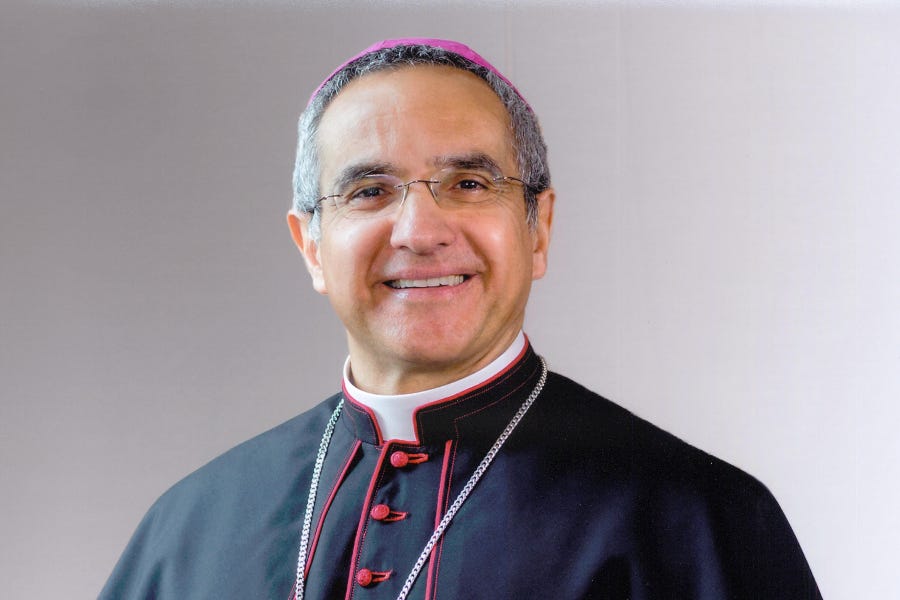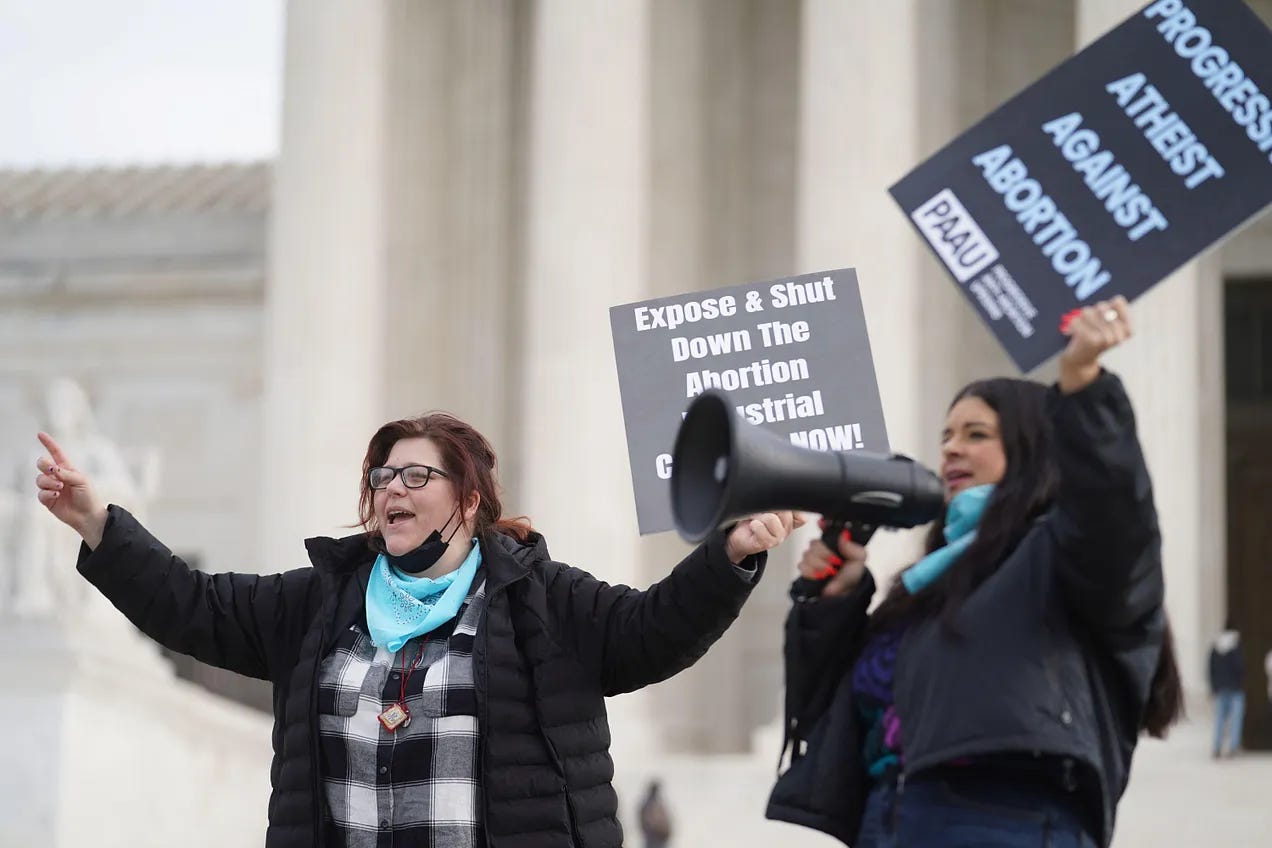Hey everybody-
First things first: Did you know that St. Elizabeth Ann Seton was a friend and neighbor to Alexander and Eliza Hamilton? Basically, if you like “Hamilton” and the first American-born saint, this is the story for you.
Read about St. Elizabeth Seton and the Ten-Dollar Founding Father here.
—
Nigeria’s bishops said last week that as violence and kidnappings escalate, the “country is on the verge of collapse.” On Saturday, Archbishop Alfred Martins of Lagos told Catholics in his diocese to respond to the violence and chaos with love.
That’s the kind of message that here in the U.S. can sound like a sentimental or pious platitude. But in a country where Christians are facing the immediate possibility of martyrdom, “loving wholeheartedly, and without any boundaries,” is not the kind of thing one counsels lightly.
Here’s more from Archbishop Martins:
Dear brothers and sisters, it is natural that we love only our friends, and those who love us. And so it is extremely difficult for us to love those who hate us so much as to want to harm us and do evil against us.”
This is the sort of scenario that we are experiencing in our country today….
It takes supernatural grace to love those who hate us.
Read about the situation for Christians in Nigeria, and watch the archbishop’s message, here.
—
If you follow the scandal of Vatican finances, you know that prosecutors are getting close to a trial, and that Cecilia Marogna, the woman accused of acting as a kind of personal intelligence agent for Cardinal Angelo Becciu, is near the center of the investigation.
Well guess what?
Vatican prosecutors have her cell phone. And her cell phone is reportedly a trove of data. So that means the Marogna-saga, as it were, is likely to become the center of evidence presented against those who come to trial. Read all about it.
—
The case of Chicago priest Fr. Michael Pfleger is getting complicated. Pfleger is a long-time pastor and social activist who is accused of sexually abusing two boys decades ago. And his parish is absolutely insistent that he is innocent.
In fact, the parish said this Sunday it plans to withhold $100k it sends to the archdiocese each month until the Pfleger case is resolved. That raises a few questions: One, why is the parish sending that much money each month to the archdiocese? and Two, who is actually calling the shots at the parish? These questions matter because withholding the legitimately imposed parish tax as an act of protest is the kind of move that bishops usually interpret in very serious canonical terms. So we talked to the parish, and looked at the issues involved.
There’s also confusion in Pfleger’s case because of a letter written by an Illinois state agency clearing him in a child abuse allegation. But while his supporters say that means he should be returned to ministry, the Chicago archdiocese says otherwise. On Friday, we broke down the civil and canonical investigations involved in clerical sexual abuse allegations, and explained where Pfleger is in the process.
—
Finally, there are rumors floating around the Church that Chicago’s Cardinal Blase Cupich could be appointed this spring to a Vatican position. You can’t put too much stock in rumors, but there are some reasons to think the Cupich-to-Vatican idea isn’t entirely far-fetched.
Of course, that leads some people to ask who might become Chicago’s next archbishop. And Ed and I suggest it may well be an American, Chicago-born bishop you probably haven’t heard of. (And dear readers, you are among the most informed Church watchers I know. So take it as no offense when I suggest this particular fellow might be off your radar.)
Here’s a glimpse at the beautiful contemplative life of these Wisconsin Cistercian nuns:
Men, and women, of the Church
I gave a talk last night, virtually, at the Aquinas Institute, the Catholic student center at Princeton University. Perhaps some of you were there. In case you weren’t, I offer some part of the talk, which focused on living as believers in a Church affected by sinfulness — in ourselves, in others, and in the Church’s leaders.
Here’s some of what I said:
The challenge for a believer is to be clear-eyed, realistic, and honest about our sins, so that we can bring them to God for forgiveness, and transformation.
There are two temptations we can face.
The first is to become despondent about our sins— to believe that we can never change, that we are destined to be as we are, that we’re stuck in the sinfulness and depravity into which we were born. That we won’t ever stop being so crappy.
But the second temptation is to become too cavalier about all that— to convince ourselves that we don’t ever really need to change. That our sins aren’t very serious at all. That things are “fine.”
There is a similar danger for thinking about our relationship to the Church. We can be excessive in deference, either to ecclesial leaders or to our own history, or we can be excessive in criticism, rejecting everything we see in the Church’s life, because it fails to measure up to some standard of perfection we expect of it.
The danger is becoming either stridently complacent, or destructively critical. If you’re listening to me speak, perhaps you consume Catholic media. And if you consume Catholic media, perhaps you can think of examples of unreflective deference and complacency. And perhaps you can also think of destructively relentless criticism that is not based in love.
One ignores sin. The other ignores grace. Neither draws us into the redemption story of Christ’s incarnation.
And the things we consume form us.
So, it’s my job as a journalist to say what I see. That’s really like 90% of the job— to see things, and to write them down. It’s a good gig.
Part of what I see right now is the seductive exploitation of righteous anger.
After the McCarrick scandal, and the Pennsylvania grand jury report, and a lot of other things that have happened in the Church in the last few years, I have seen a growing number of faithful Catholics who have become indignant with the Church, cynical about its leadership, relentlessly hostile to its life, and ministry, and teachers.
There are a lot of reasons for that. A growing distrust of institutions among all Americans, especially young ones. The genuine misuse or abuse of power in the Church. The alienation of the pandemic. But those reasons coalesce into something spiritually harmful - a sense of being more Catholic than the Church - of setting ourselves up as the judge and arbiter of the faith.
That’s tempting because indignation is emotionally satisfying. And it makes the problems of the Church someone else’s problems. The difficulty, though, is that kind of indignation chokes out charity. And it clouds the reality that the Lord is calling each one of us to build and proclaim the Kingdom. And he’s calling each one of us to play some part in renewing the Church.
We need to ask God to open our eyes to both the reality of sin, and the profundity of grace.
De Lubac says the middle ground — the sanctifying ground — is to become what Newman sought to be: “Men [and women] of the Church.”
The man, or woman, of the Church “will have fallen in love with the beauty of the House of God: the Church will have stolen his heart. She is his spiritual native country, his ‘mother and his brethren,’ and nothing which concerns her will leave him indifferent or detached; he will root himself in her soil, form herself in her likeness, and make himself one with her experience….He will be aware that through her and her alone he participates in the unshakableness of God.”
The man [or woman] of the Church, de Lubac says, will seek renewal, and integrity, and truth. He will do that out of love for the Church. But he will not presume to set himself and his own ideas out as the measure of orthodoxy and integrity— he will ask himself how he needs to be transformed as much as he will ask how the Church needs to be renewed.
“He will understand that the Catholic spirit, which is at the same time both rigorous and comprehensive, is a spirit which is ‘charitable rather than quarrelsome, in distinction from every kind of ‘spirit of faction or mere sectarianism, whether the aim of it be to evade the authority of the Church, or, on the contrary, to make a corner in it. For a man of this kind all praiseworthy initiative, every new enterprise that is duly approved, and every new centre of spiritual vitality, is an occassion for giving thanks.”
He will not be bitter, or petty, he “will not confuse orthodoxy or doctrinal firmness with narrow-mindedness or intellectual apathy.” When he sees division in the Church, “he will not start to worry...he will try to keep the peace, and make an effort to do the hard thing— retain a mind bigger than his ideas.”
“In common with the community of believers, he waits for the return of the one whom he loves, and he does not lose sight of the fact that everything should, in the last analysis, be judged with reference to that end. But at the same time he is aware that this waiting is an active waiting and should not divert us from any of the things to be done in this world; that, on the contrary, it makes those things more urgent and demanding….”
De Lubac adds this: “A man of the Church will always remain open to hope.”
Hope is a powerful thing. In hope, my friends, we are saved. May this Lent become and remain a season of hope for each of us.
—
I don’t really have a good transition for this, but here’s an interesting piece about the art and science of cooking while incarcerated. (there is at least one instance of crude language to describe life in prison.)
Also, some of you wrote poems — long, beautiful, weird, and touching poems — about why I don’t like drinking IPAs. Ed read some of them on last week’s podcast. I was genuinely touched that you guys wrote poems about my beer preferences. And genuinely befuddled by how many of you pretend to like IPAs — they’re not good.
In Hotan, a city in Xinjiang where the population is almost entirely Uighur, authorities instituted a “free birth-prevention surgery” program, which aimed to sterilize more than a third of all women of childbearing age by the end of 2019. Tursunay Ziyawudun, a Uighur nurse who spent around ten months in a camp in Kunes, told me that many of the women she was detained with underwent forced I.U.D. insertions and sterilizations.
Read it here, and pray for the Uighurs.
As always, if you like this Pillar Post, please forward it to someone who will also like it. And more important, please be assured of our prayers and please continue to pray for us.
Sincerely yours in Christ,
JD Flynn
Editor-in-Chief
The Pillar




